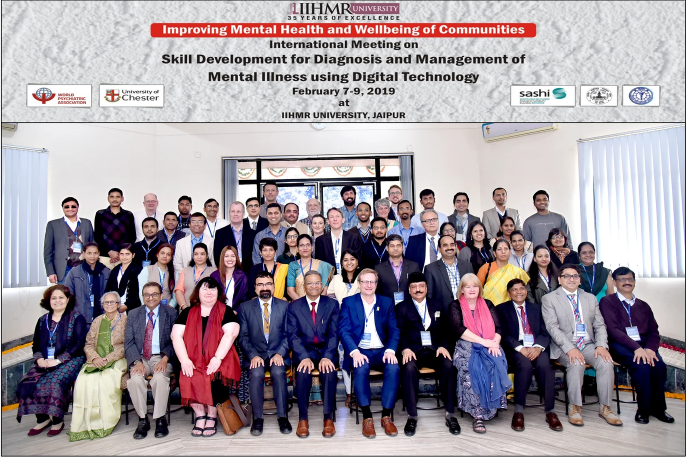
Improving Mental Health and Wellbeing of Communities using Technology

The International scientific meeting on ‘Skill Development for Diagnosis and Management of Mental Illness using Digital Technology’ was jointly organized by World Psychiatric Association (Rural Mental Health Section), University of Chester, South Asia Self Harm Research Capacity Building Initiative (SASHI), Indian Council of Medical Research (ICMR), Indian Psychiatric Society, and IIHMR University from 7 to 9 February 2019 at Jaipur, India. The three-day program included two days of training on the Global Mental Health Assessment tool (GMHAT) and the third and last day was held in conference mode. The program was successfully able to achieve its three-fold objective of describing mental illness (prevalence, categories, causes, symptoms and impact) from a public health perspective; explaining challenges in providing mental health services, preventing suicides; and developing clinical skills to assess mental illness using GMHAT/PC.
The participants included policy makers, academic professionals, psychiatrists, psychologists, nurses, representatives of voluntary organizations working on mental illnesses, social workers, counsellors, health/hospital managers, Police personnel, and representatives from Community from India and abroad. The list included an impressive 90 plus global and local participants including participation from World Psychiatric Association, University of Chester, SASHI, NIMHANS, Bengaluru, and IIHMR University India to name a few.
The key speakers Prof Thomas G Schulze (Germany), Prof Angela Simpson (UK), Prof Mohammed Abou Saleh (UK), Prof Catherine Robinson (UK), Dr Ved Prakash Mishra (Maharashtra, India), Prof Prakash Behere (Maharashtra, India), Prof Vimal Kumar Sharma (UK), Prof Anshuman Pant (Australia), Prof Santosh Chaturvedi (Karnataka, India), Prof Satish Girimaji (Karnataka, India), Dr Matt Bowen (UK), Dr Steve Jones (UK), Dr Mahesh Oyidoor (UK), Dr Paola Tejada (Colombia), Dr Rishav Koirala (Nepal), Dr Elizabeth Denley (Australia), Dr Bontha Babu (New Delhi, India), and Dr Susant Padhy Odisha (Odisha, India) shared their valuable insights.
Dr Pankaj Gupta, President IIHMR University welcomed the participants. Dr S. D Gupta, Chairman, IIHMR University delivered the keynote address on mental health – a public health perspective. The guest speaker for the session was Dr Ved Prakash Mishra, Chairman, Academic Committee, Medical Council of India, and Pro Chancellor, Dutta Meghe Institute of Medical Sciences, Wardha. In the first technical session the experts shared their experience of the implementation of GMHAT in UK, Colombia, Middle East, and in three states in India i.e. Rajasthan, Madhya Pradesh and Maharashtra. In the post lunch session, the participants were introduced to GMHAT/PC, scoring and assessments, barriers to communication regarding mental illness from the point of view of both the interviewer and the interviewee, interview techniques and administering the GMHAT using various pedagogy like role plays, individual and group exercises. Considering the language concerns of requirement of some of the participants, they were exposed to the GMHAT both in Hindi along with English version.
Five panel sessions on Emerging Trends in Mental Health, Self- Harm and Suicide, Mental Health Care: Modes of Delivery, Public Involvement in Mental Health, and Mental Health Challenges and Needs were conducted in interactive mode. The participants appreciated their active involvement and therefore, the Conference proceeding continued till 7 pm in the evening.
It was a highly successful and interactive program. All the participants shared their very positive feedback on training and the participants expressed a desire to hold GMHAT training at their respective organizations in the near future. It was the first time such a conference was held which had huge public involvement and it was suggested that such interactive and meaningful meetings be organized on a regular basis to contribute in the field significantly.
 160
160 






